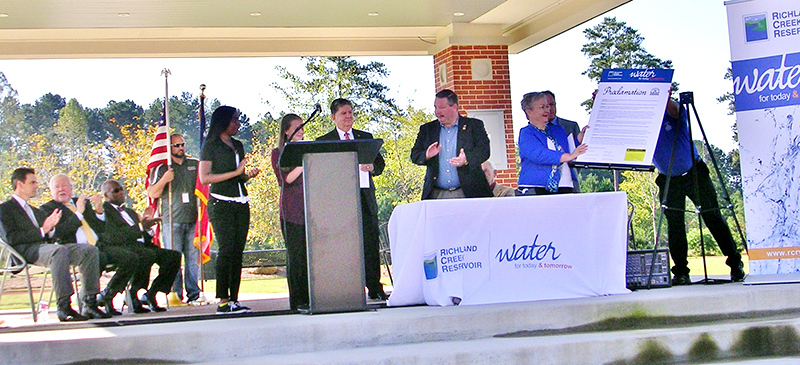Paulding County Commission Chairman David Austin and several other county and state officials gave a press conference last weekend to announce the final signing of long sought 404 Permit, a milestone in the process to build the Richland Creek Reservoir and insure the county’s water supply for decades to come. The event took place at Veterans Park in Dallas.
“It’s been 16 years and five minutes; 16 years to seek the permit and five minutes to sign it,” Austin told attendees on Saturday. “Is this it, you don’t need any blood? There are no bands playing? Austin quipped during his portion of the presentation last weekend regarding the actual document signing that occurred on October 9 concluding the 16-year process.
One former Commission Chairman, Jerry Shearin, attended the event and said the enormity of the day was just starting to sink in for him. “Bill Carruth kicked it off, I got a few first downs on the way to this, but the most important part is David [Austin] has scored a touchdown,” Shearin said. According to Kelly Comstock, the project’s chief engineer, the facility can affect the tri-state water wars favorably, freeing more water for other locales. But apart from that ongoing dispute, Paulding and the region will have secured its water source, he said.
“What this is, is a piece of the much larger puzzle that’s being worked out...that’s a part of the greater solution that will help,” Comstock said. Dallas Mayor Boyd Austin is the chair of Georgia Environmental Finance Authority (GEFA) and has had a hand in pulling the purse strings that helped with state-sponsored financing. Mayor Austin commented Saturday on the impact of the project in the region.
“The main thrust of the water wars is the Apalachicola-Chattahoochee-Flint (ACF) system; so really our only litigant would be Alabama and they have basically given consent on the Richland Creel Reservoir because it is an off-system reservoir. It will not affect low-flow measurement...so if we’re in a period of drought and water is running low in the Etowah, we will not be doing an intake...it’s’ off-system and it’s not damning or creating any kind of impediment for the flow in the river and that’s the big difference for what happens in the ACT basin or the ACF, which is basically the Chattahoochee,” Mayor Austin said.
Paulding County has an agreement that runs until 2032 with Cobb-Marietta Water Authority, an independent state-chartered agency, which receives water from Lake Allatoona, a USCOE-controlled reservoir. Lake Allatoona has been the subject of multi-state, decades-long disputes over access and allocations, leaving Paulding County vulnerable to supply restrictions. With the Richland Creek Reservoir project, says Comstock, the county can now build its own independent water supply and distribution system, with capacity modeled to serve residents for at least the next 50 years. Katherine Zitsch, manager of the Natural Resources Division of the Atlanta Regional Commission, agrees, noting that the project "will allow Paulding County to pull off of the Cobb-Marietta system, which in turn gives Cobb-Marietta more water for its other customers.”
But Comstock said also that the connectivity between Cobb and Paulding will still be there in an emergency situation that could send water in either direction. The reservoir is designed to yield about 35 million gallons per day and will provide about 3.43 billion gallons of water storage to support Paulding County.
Construction will likely begin sometime next year. The county will use state direct investment, low interest loans provided through GEFA and utility bonds to pay for the facility. Officials cited the need for another water source amidst the county’s rapid growth in population in the 1990s and early 2000s. Voters approved the reservoir in 1999. In December of 2007, the Metropolitan North Georgia Water Planning District, which covers the 16-county metro Atlanta area, approved the RCR project to be included in the water conservation and management plan.
Both Commissioners Tony Crowe and Post 2 Commissioner Todd Pownall have indicated that the current board does support the project, despite a large amount of funding needed to bring the facility online by 2019. Atlanta Regional Commission population projections show Paulding growing to 255,000 residents by 2040. Paulding County remains among the fastest-growing in the state. Among Georgia’s 159 counties, Paulding is the 14th largest.
Congressman Tom Graves, Rep. Howard Maxwell and Laurie Ashmore, acting director, Paulding Water System.(Photo: R. Grant)



















